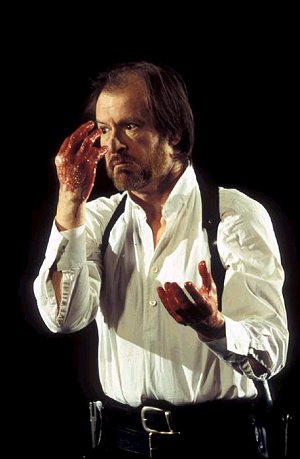|
Howard first made his entrance onto the London
stage, very much the young actor, in the early 60s.
"I suppose I wasn't
quite in time to be classed 'an angry young man'," he says. "That was really
the mid- to late-fifties. By 1960/61 things had moved on to what was known as
'kitchen sink dramas', and that was especially true of the Wesker trilogy I
played in at the Royal Court. Arnold was writing at the same time as the angry
young men but wasn't considered one of their number. The plays nevertheless
gave me my first London successes for which I am naturally
grateful."
Thenceforward, Howard's career was not so much
meteoric as more a steady plod to the top of his profession. By 1970 he was
Trevor Nunn's Hamlet and a year later he made his New York debut playing
Theseus/Oberon in Peter Brook's celebrated production of A Midsummer Night's
Dream. Another decade down the road and Howard had swept up most of the
important theatrical awards and was the RSC's blue-eyed boy with an almost
ubiquitous presence at the top of every cast list the company
printed.
The memory touches those quasi-regal parts of a
man renowned for his kings. You feel his first person plural has a singular
construction and refers not to other cast members but to just himself.
"We
were lucky to be part of a milieu which might be seen now as the Aldwych
heyday, offering a year at Stratford and a year in London and often tours
abroad to Europe or America. Over a four year period we completed the full
cycle of the central history plays, starting with the Henry VI trilogy
and ending with Richard II and Richard III back-to-back. Sadly it
was Richard II which rang down the curtain on the RSC's time at the
Aldwych, although their commercial production of C P Taylor's Good
followed it. It meant, in fact, I was in the last subsidised and the first
unsubsidised RSC productions there."
After the commercial run of Good, with
which he again went to Broadway, and Stephen Poliakoff's RSC Mermaid transfer
Breaking the Silence, Howard became a theatrical flatliner, producing
not so much as a blip on the dramatic scene. There was lots of television and
some film and radio work, but the stage was effectively given
up.
"It was a conscious decision. I felt I'd done
so much and I just wanted a break from the rigours that the theatre imposes.
When you're rehearsing all day and performing every night you're almost
divorced from the real world and eventually you crave to get back to it, just
to be normal for a while. And then, at the time, my child was no longer a baby
and the irregular hours meant hardly seeing each other....."
There's a certain irony about the fact that the
wilderness years were ended by a Swedish variation on the kitchen sink dramas
that first brought Howard to prominence. This was Scenes From A
Marriage, Ingmar Bergman's adaptation of his own six-part television play
which opened in Chichester in the summer of 1990. The power of Howard's
presence in this play was largely the reason for its transfer to the Wyndham's
Theatre for an unscheduled West End run. Then, last year, Howard joined the
National Theatre to play Professor Higgins in Howard Davies' production of
Shaw's Pygmalion. It became a sell-out success and played for ten months. There
seemed little doubt now that Howard would once again rise through the ranks
from kitchen sink to kingship, eschewing aprons for ermine and prose for verse.
And now, sure enough, with Macbeth, one of the country's front rank
actors is not just back in the saddle but firmly settled on the
throne.
From the outset Alan Howard's thane is questing
and insecure and soon seems to be tasting hell itself, standing within a ring
of fire with a thin veil of smoke twisting around him and curling to the flies.
The nub of Howard's Macbeth is motivation: what makes him commit such
atrocities? Howard's performance suggests the answer is twofold: in an age more
pagan than god-fearing, he takes the witches' predictions as gospel. Although
tentative in the good king Duncan's court and suspicious of easy advancement
(Howard doing his mock surprise 'who me?' expression), he already has the air
of an Oscar nominee with an inside tip of his imminent win, all brittle smile
and dagger eyes. And in his final duel with Macduff, he displays the arrogance
of immortality, merely going through the motions of self-defence, flicking his
sword rather than wielding it.
Anastasia Hille's Lady Macbeth, an alabaster
blonde in figure-hugging black velvet and twenty years her husband's junior,
provides the other reason for over-weaning ambition. Howard is not best known
for his body language or histrionics, but here he clearly desires his wife to
literal distraction. In one memorable scene as the Macbeths rinse blood from
their hands kneeling before a cold water tub, Howard lets fly a high-pitched
warble heralding a descent to hell that chills the audience to its collective
soul. Elsewhere Howard is marvellous in his almost schizoid mood swings -
philosophical on the battlements of Bob Crowley's high timber fortress as he
reaches into black night for the dagger he sees before him, or barking mad when
Banquo's ghost rises from the ground to usurp Macbeth's place at the banquet
table. Here, to my mind, is a great Macbeth given by a great actor now truly in
his prime. Miss it at your peril. |
